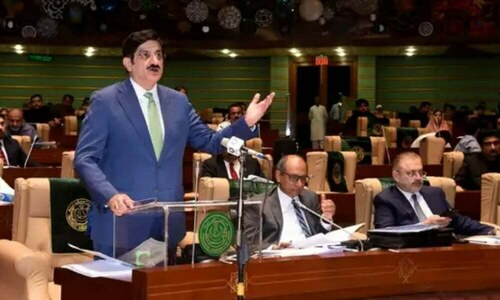Sindh Budget FY26: Rs3.45 Trillion Unveiled with Sales Tax Cut
KARACHI: Sindh Chief Minister Syed Murad Ali Shah presented a Rs3.45 trillion provincial budget for the fiscal year 2025-26 (FY26) in the Sindh Assembly on Friday. The budget includes a deficit of Rs38.458 billion and proposes reducing the sales tax on services to 8 percent, amidst opposition protests.
During the budget address, the Chief Minister outlined the administration’s “development agenda focused on the future,” highlighting several “transformative new initiatives” across vital sectors such as education, healthcare, agriculture, infrastructure, social security, and local administration. He stated, “These projects demonstrate our dedication to fairness, innovation, and comprehensive progress.”
Budget Highlights
According to official documents, the Sindh government’s budget has risen by Rs394 billion, or 13 percent, to Rs3.450 trillion for FY26, compared to Rs3.056 trillion in the previous fiscal year. Total provincial revenue is projected to increase by 12 percent, from Rs3.056 trillion in FY25 to Rs3.412 trillion in the upcoming fiscal year.
Revenue Projections
Current revenue receipt forecasts show a 10 percent increase to Rs2.824 trillion. This includes Rs1.927 trillion from revenue assignment, Rs116.433 billion from straight transfers, Rs51.81 billion in grants to offset losses, Rs288 billion from provincial tax receipts (excluding GST on services), and Rs388 billion from provincial sales tax on services and taxes from agriculture.
Additionally, the budget anticipates Rs33 billion in current capital receipts, a carryover balance of Rs100 billion, Rs10.838 billion in foreign grants, Rs366.744 billion in foreign project assistance, and Rs75.58 billion in other grants.
Expenditure Estimates
Budget estimates place Current Revenue Expenditure (CRE) at Rs2.150 trillion, 12.4 percent higher than the FY 2024-25 estimate of Rs1.912 trillion. This rise is mainly due to inflation affecting operating costs, increased grants-in-aid to non-financial institutions (including hospitals, public universities, and local councils), necessary salary increases for government employees in the form of relief allowances, and higher pension costs.
However, current capital expenditure estimates have increased from Rs184 billion to Rs281.6 billion.
Key Initiatives
- Projects related to public health and sustainable development goals are expected to receive Rs45 billion, with half allocated to water sector schemes, enhancing clean water access and climate resilience.
- Rs25 billion is allocated for home-based solar systems, including funds to expand decentralized, off-grid solar solutions for households in rural and underserved areas.
The Chief Minister also mentioned an upcoming comprehensive, multi-year agriculture reform program designed to modernize farming practices, boost livelihoods, and strengthen food security. The Benazir Hari Card will serve as the distribution platform for subsidies and services, with 200,000 farmers already enrolled.
New home constructions are projected to rise from 1.1 million to around 1.5 million in the next fiscal year. He added, “We have created bank accounts for over 1.3 million beneficiaries to assist the rehabilitation of over 12.3 million people affected by floods.”
The irrigation sector will be allocated Rs42 billion, reflecting the Sindh government’s commitment to farmers and enhancing the irrigation infrastructure. This includes a proposed Rs10 billion for de-silting the N W Canal and Dadu Canal during the Sukkur Barrage closure next year, ensuring the upkeep of irrigation facilities and uninterrupted water flow.
A proposed budget of Rs12.9 billion for the livestock and fisheries sector aims to educate livestock farmers on diverse breeds, modern breeding techniques, fodder cultivation, and fishing and aquaculture, with Rs120 million specifically earmarked for this purpose.
Relief Measures
- The government has proposed a 10 percent ad-hoc allowance for employees in BPS-1 to BPS-22 to help them cope with inflation.
- A 7 percent increase in pensions has been proposed for the next fiscal year.
These relief measures will have a cumulative annual impact of around Rs52 billion, the Chief Minister noted. As part of its inclusive policies, the government plans to increase the monthly Special Conveyance Allowance from Rs4,000 to Rs6,000 for differently-abled employees, which will incur an additional financial impact of Rs114.48 million.
The government is also considering a decision on the minimum wage for the labor class, taking into account rising inflation and the increasing cost of living.



Comments (0)
No comments yet. Be the first to comment!
Leave a Comment